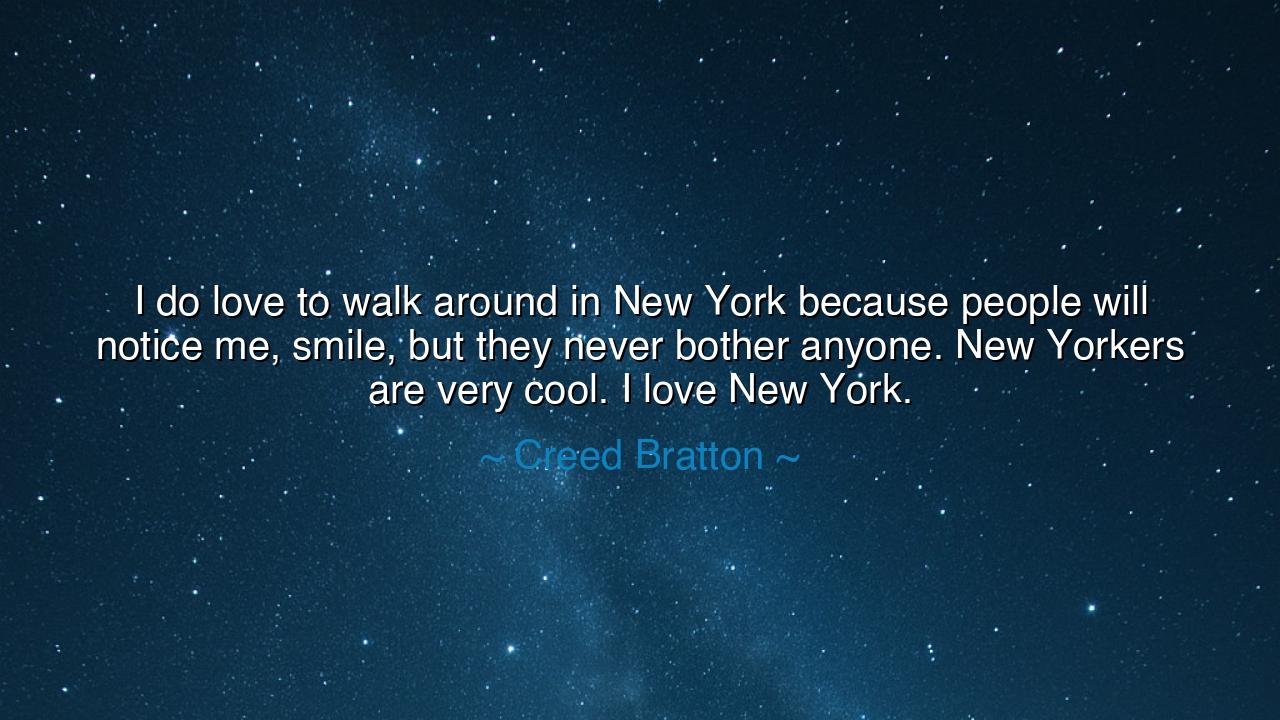
I do love to walk around in New York because people will notice
I do love to walk around in New York because people will notice me, smile, but they never bother anyone. New Yorkers are very cool. I love New York.






Creed Bratton once spoke with simple joy: “I do love to walk around in New York because people will notice me, smile, but they never bother anyone. New Yorkers are very cool. I love New York.” Though light in tone, these words reveal a profound harmony between individuality and community. They remind us that in the bustling heart of one of the world’s greatest cities, there exists a balance: recognition without intrusion, acknowledgment without suffocation, the rare gift of respect for space alongside the warmth of the smile.
To the ancients, such harmony would be considered a kind of civic virtue, a spirit that elevates a city beyond stone and steel. The Greeks once spoke of polis, the living spirit of the city that was not built by walls or streets, but by the conduct of its people. In this, New York reveals its own soul—a place where one can walk amidst millions, be seen and greeted with humanity, yet remain free to journey alone. This is no small matter, for true greatness in society lies in balancing the needs of the self with the bonds of the many.
History offers us a mirror. Consider the grandeur of ancient Rome, where emperors paraded in triumph through the crowded streets. The people cheered, they noticed, they celebrated, yet the procession carried on with order and dignity. Rome was vast, noisy, alive—yet it thrived because its citizens knew how to live both together and apart. Just as the Roman citizen gave a nod of acknowledgment to his neighbor in the Forum without demanding his private affairs, so too does the New Yorker glance, smile, and allow the other to continue in peace.
There is also a deeper lesson about freedom in Bratton’s words. For in some places, recognition brings burden, and fame brings chains. But in a city like New York, the spirit of independence runs so strongly that even in the act of noticing, there is restraint. To be seen but not suffocated, to be greeted but not hindered—this is a form of liberty that allows both the famous and the ordinary to coexist in the same streets. The coolness of New Yorkers, as Bratton calls it, is the wisdom of allowing each soul to walk its path unbroken.
But what, my children, does this teach us about life beyond the city? It is this: we must learn to recognize others without the need to possess them. We must cultivate the art of offering kindness without invasion, of giving respect without demand. The smile is the perfect symbol of this—an acknowledgment that costs nothing, a gesture that uplifts, yet asks for nothing in return. When we master this, whether in crowded streets or quiet villages, we create spaces of trust and freedom.
The example of New York stands as both myth and truth, a modern city embodying ancient wisdom. It shows us that the greatness of a place lies not merely in its monuments or towers, but in the way its people live together. A single city block becomes a lesson in human dignity: see others, honor them, and let them be. This is what it means for a city, or even a family, or a community, to be “cool.”
Therefore, take this lesson into your life: walk among others with open eyes and a kind heart, but do not grasp too tightly. Offer the gift of the smile, the nod, the quiet acknowledgment of another’s humanity. In so doing, you will carry the spirit of New York, and of all great cities, wherever you go. And remember—love of place is not just about the streets you walk, but about the people you encounter and the respect you give them.
For in the end, as Creed Bratton proclaimed, “I love New York”—and what he truly loved was not only the city itself, but the way its people embodied this delicate dance of recognition and freedom. Let us, too, love the places we call home by carrying that same spirit into every step we take.






AAdministratorAdministrator
Welcome, honored guests. Please leave a comment, we will respond soon